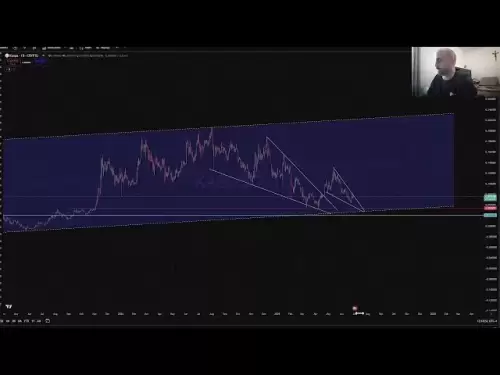-
 Bitcoin
Bitcoin $107,341.7259
0.15% -
 Ethereum
Ethereum $2,438.6204
0.70% -
 Tether USDt
Tether USDt $1.0003
-0.02% -
 XRP
XRP $2.1866
1.94% -
 BNB
BNB $649.0952
0.36% -
 Solana
Solana $150.9602
5.63% -
 USDC
USDC $0.9999
0.00% -
 TRON
TRON $0.2742
0.40% -
 Dogecoin
Dogecoin $0.1645
1.93% -
 Cardano
Cardano $0.5669
1.18% -
 Hyperliquid
Hyperliquid $37.8286
4.19% -
 Bitcoin Cash
Bitcoin Cash $491.4669
-2.74% -
 Sui
Sui $2.8150
3.06% -
 Chainlink
Chainlink $13.4184
2.91% -
 UNUS SED LEO
UNUS SED LEO $9.0809
0.27% -
 Avalanche
Avalanche $18.0295
2.60% -
 Stellar
Stellar $0.2396
1.19% -
 Toncoin
Toncoin $2.8587
0.13% -
 Shiba Inu
Shiba Inu $0.0...01160
2.59% -
 Litecoin
Litecoin $86.4192
1.45% -
 Hedera
Hedera $0.1486
1.19% -
 Monero
Monero $308.4324
0.87% -
 Polkadot
Polkadot $3.4202
1.43% -
 Bitget Token
Bitget Token $4.6436
-0.34% -
 Dai
Dai $0.9998
-0.02% -
 Ethena USDe
Ethena USDe $1.0002
0.00% -
 Uniswap
Uniswap $7.1527
3.29% -
 Pi
Pi $0.5357
-8.45% -
 Pepe
Pepe $0.0...09588
4.61% -
 Aave
Aave $259.9759
0.81%
How to enable multi-chain support in Trust Wallet?
To enable multi-chain support in Trust Wallet, add custom networks by entering specific details like RPC URL and Chain ID, and always verify from trusted sources.
Apr 01, 2025 at 04:36 am
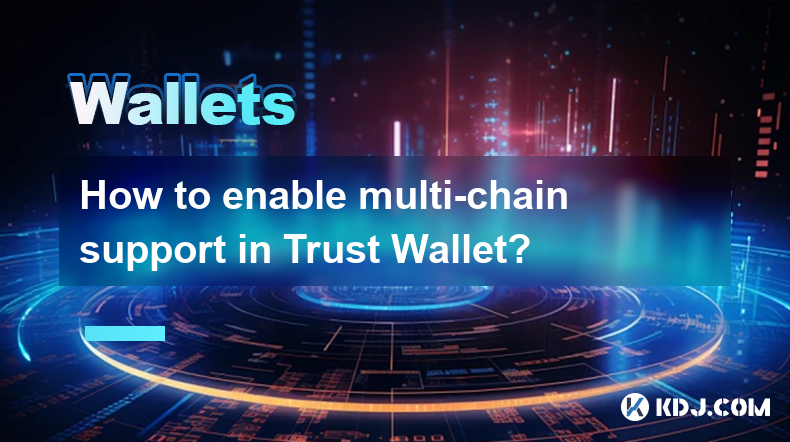
How to Enable Multi-Chain Support in Trust Wallet
Trust Wallet, a popular mobile cryptocurrency wallet, boasts support for a wide array of blockchains and tokens. However, accessing these different networks often requires specific setup steps. This article details how to enable support for multiple chains within your Trust Wallet application.
Understanding Multi-Chain Support
Before diving into the specifics, it's crucial to understand what multi-chain support entails. Essentially, it means your wallet can interact with various blockchain networks, not just one. This allows you to hold and manage assets from different blockchains, such as Bitcoin (BTC) on Bitcoin's blockchain, Ethereum (ETH) on the Ethereum blockchain, and Binance Coin (BNB) on the Binance Smart Chain, all within the same wallet app. This simplifies asset management significantly.
Adding a New Blockchain Network
Trust Wallet doesn't automatically enable all blockchains. You need to add support for each network you wish to use individually. This usually involves adding a custom network. The process is generally straightforward but varies slightly depending on the specific blockchain.
- Find the "Add Custom Token" or Similar Option: This option is typically located in the settings or within the portfolio section of your Trust Wallet app. The exact location might vary depending on your app version. Look for options like "Add a Custom Token," "Manage Tokens," or similar.
- Input the Required Network Details: Each blockchain requires specific information. You'll need the network name, RPC URL, Chain ID, Symbol, Block Explorer URL, and Currency Decimal. These details are readily available online for most major blockchains; a quick Google search for "[Blockchain Name] RPC URL" will usually provide the necessary information. Ensure you obtain this information from reputable sources to avoid scams or errors.
- Double-Check Your Input: Carefully review all the entered data. Even a small mistake in the Chain ID or RPC URL can prevent the network from working correctly. Incorrect information could lead to the loss of funds, so accuracy is paramount.
- Save and Verify: After inputting all the details, save the custom network. Try sending a small test transaction to a different wallet address on the same network to verify the network is added correctly. Never send significant amounts of cryptocurrency as a test.
Common Blockchains and Their Setup
While the process is similar across different blockchains, the required details vary. Here are some examples:
Ethereum (ETH): For Ethereum Mainnet, you typically don't need to add it manually as it's usually pre-integrated. However, you might need to add specific Ethereum-based tokens. The process remains the same as described above.
Binance Smart Chain (BSC): BSC is another popular blockchain. You will find the necessary RPC URL and other details on the Binance website or reputable community forums. Always verify the information from trusted sources.
Polygon (MATIC): Polygon, a scaling solution for Ethereum, also requires adding a custom network with its specific parameters. These parameters can be easily found online. Be cautious of phishing websites offering false network information.
Solana (SOL): Solana is another popular blockchain with its own unique set of parameters. You will need to find the correct RPC URL and other details for your Solana network. Double-check the information before adding it to your wallet.
Troubleshooting Common Issues
If you encounter problems, here are some common troubleshooting steps:
- Verify Network Details: Double-check all the network details you entered. Even a minor typo can prevent the network from working.
- Check Your Internet Connection: A poor internet connection can interfere with the process. Ensure you have a stable connection.
- Update Trust Wallet: An outdated version of the app might not support the latest blockchains. Update to the latest version.
- Consult Community Forums: If you're still having trouble, search for solutions on reputable cryptocurrency forums or the official Trust Wallet community channels. Be wary of unsolicited help or links from unknown sources.
Security Considerations
When adding custom networks, security is paramount:
- Only use trusted sources for network information: Avoid using information from untrusted websites or individuals.
- Double-check all information before saving: Carefully review all details to avoid errors.
- Test with small amounts of cryptocurrency: Never send significant amounts of cryptocurrency until you've verified the network is working correctly.
Frequently Asked Questions
Q: Can I add any blockchain to Trust Wallet?
A: Trust Wallet supports a vast number of blockchains, but not all. Some obscure or less-used blockchains may not be directly supported and might require more complex setup procedures or may not be supported at all.
Q: What happens if I enter incorrect network details?
A: Entering incorrect network details can prevent you from accessing your funds on that specific network. In extreme cases, it could potentially lead to irreversible loss of funds if you send transactions to the wrong network.
Q: Is adding custom networks risky?
A: Adding custom networks carries some risk if you use incorrect information or fall prey to phishing scams. Always double-check your information and only use trusted sources.
Q: My added network isn't working. What should I do?
A: First, verify the network details you entered. Then, check your internet connection and ensure your Trust Wallet app is updated. If the problem persists, seek help from the Trust Wallet community or other reputable sources.
Q: How many blockchains can I add to Trust Wallet?
A: There's no strict limit on the number of blockchains you can add, but practically, you'll likely only need a few that you actively use. Adding too many could clutter your wallet interface.
Disclaimer:info@kdj.com
The information provided is not trading advice. kdj.com does not assume any responsibility for any investments made based on the information provided in this article. Cryptocurrencies are highly volatile and it is highly recommended that you invest with caution after thorough research!
If you believe that the content used on this website infringes your copyright, please contact us immediately (info@kdj.com) and we will delete it promptly.
- AI Token Taking Over: Why Smart Investors are Eyeing Audited Crypto Ruvi AI
- 2025-06-29 04:30:12
- Ethereum, AI Tokens, and Growth: Is Ruvi AI the Next Big Thing?
- 2025-06-29 04:30:12
- Hedera Price: Decoding Technical Signals and Upside Potential
- 2025-06-29 04:50:13
- Altcoin Rally on the Horizon? Decoding the Potential Boom
- 2025-06-29 04:35:12
- On-Chain Data Deep Dive: Altcoin Growth & Transaction Volume Insights
- 2025-06-29 05:30:13
- Cryptos, Real Growth, 2025: Navigating the Landscape
- 2025-06-29 05:30:13
Related knowledge

How to stake cryptocurrencies on Coinbase? Benefits and risks
Jun 27,2025 at 06:36pm
Understanding Cryptocurrency Staking on CoinbaseStaking cryptocurrencies involves locking up digital assets to support the operations of a blockchain network, typically in return for rewards. Coinbase, one of the most popular cryptocurrency exchanges globally, offers staking services for several proof-of-stake (PoS) coins. Users can stake their holdings...

How to contact Coinbase customer service? Support channels and response times
Jun 28,2025 at 01:29pm
Contacting Coinbase Customer Service: Support Channels and Response TimesIf you're a user of Coinbase, reaching their customer service team may become necessary for various reasons, such as account verification issues, transaction disputes, or technical difficulties. Understanding the different support channels available and what to expect in terms of r...

Coinbase advanced trading function usage tutorial: limit orders and market orders
Jun 28,2025 at 09:07pm
Understanding the Difference Between Limit Orders and Market OrdersWhen using Coinbase's advanced trading features, it is crucial to understand the fundamental difference between limit orders and market orders. A market order executes immediately at the best available price on the market. This type of order ensures that your trade goes through quickly, ...
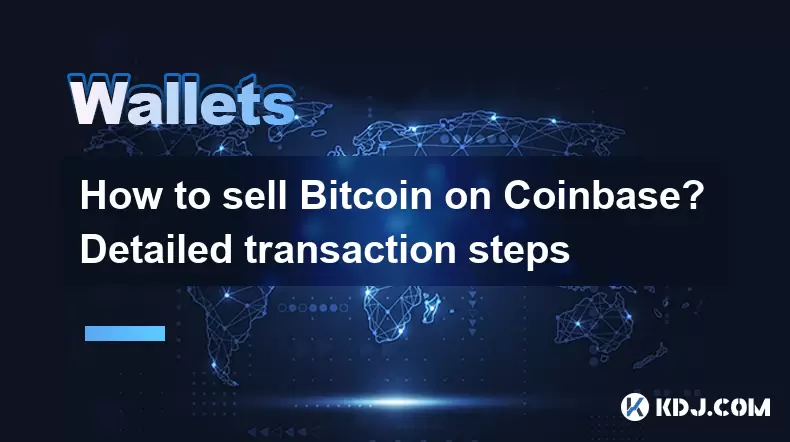
How to sell Bitcoin on Coinbase? Detailed transaction steps
Jun 29,2025 at 04:22am
Setting Up Your Coinbase Account for TransactionsBefore you can sell Bitcoin on Coinbase, you must ensure your account is fully set up and verified. Coinbase requires identity verification to comply with regulatory standards. This process involves uploading a government-issued ID, confirming your address, and sometimes submitting a selfie holding the ID...
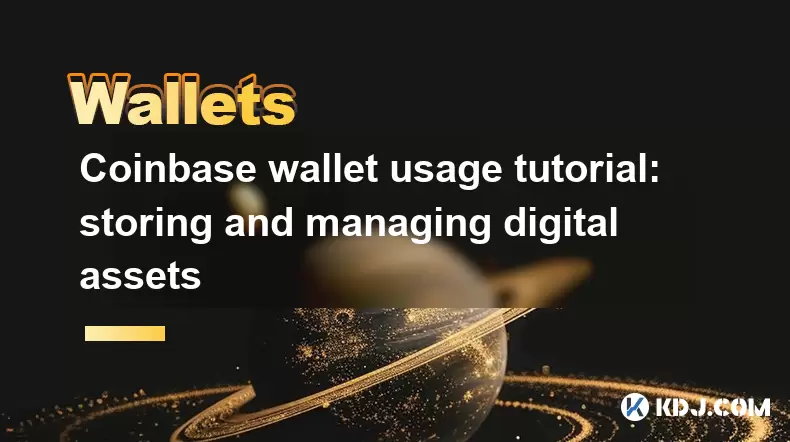
Coinbase wallet usage tutorial: storing and managing digital assets
Jun 29,2025 at 04:28am
Setting Up Your Coinbase WalletTo begin using the Coinbase wallet, you must first download and install the application. The Coinbase wallet is available on both iOS and Android platforms, making it accessible to a wide range of users. Once downloaded, open the app and select the option to create a new wallet. This process will prompt you to set up a sec...
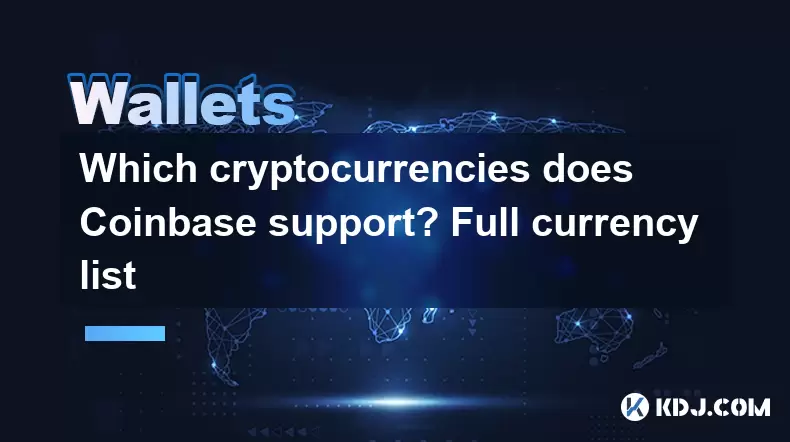
Which cryptocurrencies does Coinbase support? Full currency list
Jun 28,2025 at 08:36am
Overview of Cryptocurrencies Supported by CoinbaseCoinbase is one of the most popular and trusted cryptocurrency exchanges globally. It provides users with a platform to buy, sell, trade, and store various digital assets. As of the latest updates, Coinbase supports over 200 cryptocurrencies, including major ones like Bitcoin (BTC), Ethereum (ETH), and L...

How to stake cryptocurrencies on Coinbase? Benefits and risks
Jun 27,2025 at 06:36pm
Understanding Cryptocurrency Staking on CoinbaseStaking cryptocurrencies involves locking up digital assets to support the operations of a blockchain network, typically in return for rewards. Coinbase, one of the most popular cryptocurrency exchanges globally, offers staking services for several proof-of-stake (PoS) coins. Users can stake their holdings...

How to contact Coinbase customer service? Support channels and response times
Jun 28,2025 at 01:29pm
Contacting Coinbase Customer Service: Support Channels and Response TimesIf you're a user of Coinbase, reaching their customer service team may become necessary for various reasons, such as account verification issues, transaction disputes, or technical difficulties. Understanding the different support channels available and what to expect in terms of r...

Coinbase advanced trading function usage tutorial: limit orders and market orders
Jun 28,2025 at 09:07pm
Understanding the Difference Between Limit Orders and Market OrdersWhen using Coinbase's advanced trading features, it is crucial to understand the fundamental difference between limit orders and market orders. A market order executes immediately at the best available price on the market. This type of order ensures that your trade goes through quickly, ...

How to sell Bitcoin on Coinbase? Detailed transaction steps
Jun 29,2025 at 04:22am
Setting Up Your Coinbase Account for TransactionsBefore you can sell Bitcoin on Coinbase, you must ensure your account is fully set up and verified. Coinbase requires identity verification to comply with regulatory standards. This process involves uploading a government-issued ID, confirming your address, and sometimes submitting a selfie holding the ID...

Coinbase wallet usage tutorial: storing and managing digital assets
Jun 29,2025 at 04:28am
Setting Up Your Coinbase WalletTo begin using the Coinbase wallet, you must first download and install the application. The Coinbase wallet is available on both iOS and Android platforms, making it accessible to a wide range of users. Once downloaded, open the app and select the option to create a new wallet. This process will prompt you to set up a sec...

Which cryptocurrencies does Coinbase support? Full currency list
Jun 28,2025 at 08:36am
Overview of Cryptocurrencies Supported by CoinbaseCoinbase is one of the most popular and trusted cryptocurrency exchanges globally. It provides users with a platform to buy, sell, trade, and store various digital assets. As of the latest updates, Coinbase supports over 200 cryptocurrencies, including major ones like Bitcoin (BTC), Ethereum (ETH), and L...
See all articles























